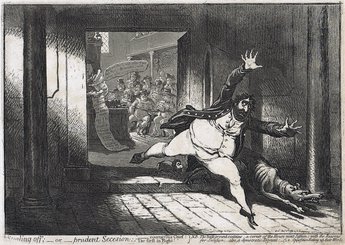'Stealing off; - or - prudent secession'
Only £225.00
Size 36cm x 26cm
Originally published by Hannah Humphrey etched by James Gillray from 'The Genuine Works of James Gillray, engraved by himself. Thomas McLean edition on heavy rag-paper from the original copper plates printed 1830.
One of the ways Gillray helps his audience understand the significance of a political event is through one or more textual allusions which explain, reinforce, or sometimes refine his visual image. In this print, he includes several such allusions to contemporary newspaper coverage, to well-known literary works, and to a common metaphor, each one adding another shade of meaning to the print.
In May of 1797, after significant defeats on motions to repeal the Alien and Sedition laws and to reform Parliamentary representation, Fox, along with a number of his supporters, announced their intention of seceding from Parliament. Henceforward they would attend only when critical votes were being cast, but otherwise refrain from attendance or participation in debate.
At first, the Whigs' secession was seen as petulant and irresponsible, a dereliction of duty to their constituents, and a tacit admission that their proposals failed to resonate with the majority of members of Parliament. But by November, after the Whigs had been thoroughly embarrassed by Arthur O'Connor's confession of collusion with the French (see Evidence to Character: being a Portrait of a Traitor by His Friends and by Himself) and Nelson's spectacular victory at the Battle of the Nile, the Tory newspaper, the True Briton, began characterizing the secession as "prudent." In the October 12th edition, Gillray could have read that:
'Nothing can be more prudent than Mr. Fox's resolution to secede from Parliament; for nothing he could now say against [the administration's] public measures would tend to bring upon them the least discredit, but, on the contrary, would lead the People to suppose that they are pregnant with the most beneficial objects, because he opposed them.'
And in the October 4th edition, he would have seen this:
'The intention of some of the leading Members of the Opposition Seceding from their duties in Parliament next Session, is founded on more prudence than many are aware of—Perhaps they are afraid of being called upon for a recantation—or, in softer terms, an Explanation of their Maidstone Evidence [where they had vouched for O'Connor's loyalty]; and that may be so awkward a thing to face, that facing to the right about may be more adviseable.'
The title of the print would, then, immediately remind Gillray's audience of a succession of Whig embarrassments and help explain Fox's headlong dash from the chamber accompanied by his now chastened attack dog, Charles Grey, and his diminutive ally, Michael Angelo Taylor.
As the author of the London und Paris account of this print first recognized, the subtitle of the print "courageous Chief! The first in Flight" is also an allusion—in this case to Milton's Paradise Lost Book IV (920-21) where Gabriel mocks the cowardice of Satan in leaving behind his fellow fallen angels while he flies off to earth to seduce Adam and Eve. So, not for the first time in Gillray's work, we are asked to see Fox as Satan, in this case abandoning his fellow Whigs (whom we can see in the chamber behind him) as he retreats in fear and shame to his wife's estate at St Ann's Hill. But this is not the end of the allusions. Through the open door of the House of Commons, we can see two scrolls being offered to the remaining Whigs by Prime Minister, William Pitt as evidence of Opposition lies or misapprehensions. And from off stage, Pitt says "'Read o'er This! - And after this! - And then to Breakfast, with what appetite you may!!! The scrolls allude to the defeat of the Irish Rebellion, the treachery of O'Connor, and the triumph of Nelson—all of which contradicted Whig arguments and positions. But Pitt's words are a close quotation from one of Gillray's favourite Shakespearean scenes, in Henry VIII, Act 3, Scene 2 where Henry confronts the traitor Wolsey with evidence of his wrongdoing. So not only does the allusion set up an equivalence of Fox and Wolsey, it also introduces the metaphor of eating which Gillray is able to exploit in the satiric portraits of Sheridan, Tierney, Erskine, Nicholls, Burdett, and Shuckburgh all of them, in the common expression, having to "eat their words."
As in Nelson's Victory, or Good-News Operating upon Loyal Feelings, Gillray is able to draw upon the reservoir of his previous characterizations so that each "meal" is personalized and appropriate to the Whig member being caricatured. The Irishman and friend of Arthur O'Connor, Richard Brinsley Sheridan, for instance, is seen eating "Loyalty of the Irish Nation. And the perennial egotist, Thomas Erskine, is seen eating "my own Loyalty." Unlike Gillray's earlier Parliamentary-Reform, or Opposition-Rats, Leaving the House They had Undermined which also showed Fox fleeing from the Commons, this print makes extensive use of aquatint giving it a darker feel in spite of a seemingly triumphant message. (www.james-gillray.org)
 View Account
View Account
